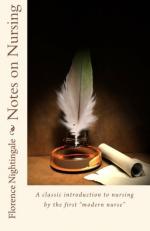2. Defect in choice of diet;
3. Defect in choice of hours for taking diet;
4. Defect of appetite in patient.
Yet all these are generally comprehended in the one sweeping assertion that the patient has “no appetite.”
Surely many lives might be saved by drawing a closer distinction; for the remedies are as diverse as the causes. The remedy for the first is to cook better; for the second, to choose other articles of diet; for the third, to watch for the hours when the patient is in want of food; for the fourth, to show him what he likes, and sometimes unexpectedly. But no one of these remedies will do for any other of the defects not corresponding with it.
I cannot too often repeat that patients are generally either too languid to observe these things, or too shy to speak about them; nor is it well that they should be made to observe them, it fixes their attention upon themselves.
Again, I say, what is the nurse or friend there for except to take note of these things, instead of the patient doing so?[3]
[Sidenote: As to diarrhoea]
Again, the question is sometimes put, Is there diarrhoea? And the answer will be the same, whether it is just merging into cholera, whether it is a trifling degree brought on by some trifling indiscretion, which will cease the moment the cause is removed, or whether there is no diarrhoea at all, but simply relaxed bowels.
It is useless to multiply instances of this kind. As long as observation is so little cultivated as it is now, I do believe that it is better for the physician not to see the friends of the patient at all. They will oftener mislead him than not. And as often by making the patient out worse as better than he really is.
In the case of infants, everything must depend upon the accurate observation of the nurse or mother who has to report. And how seldom is this condition of accuracy fulfilled.
[Sidenote: Means of cultivating sound and ready observation.]
A celebrated man, though celebrated only for foolish things, has told us that one of his main objects in the education of his son, was to give him a ready habit of accurate observation, a certainty of perception, and that for this purpose one of his means was a month’s course as follows:—he took the boy rapidly past a toy-shop; the father and son then described to each other as many of the objects as they could, which they had seen in passing the windows, noting them down with pencil and paper, and returning afterwards to verify their own accuracy. The boy always succeeded best, e.g., if the father described 30 objects, the boy did 40, and scarcely ever made a mistake.
I have often thought how wise a piece of education this would be for much higher objects; and in our calling of nurses the thing itself is essential. For it may safely be said, not that the habit of ready and correct observation will by itself make us useful nurses, but that without it we shall be useless with all our devotion.




